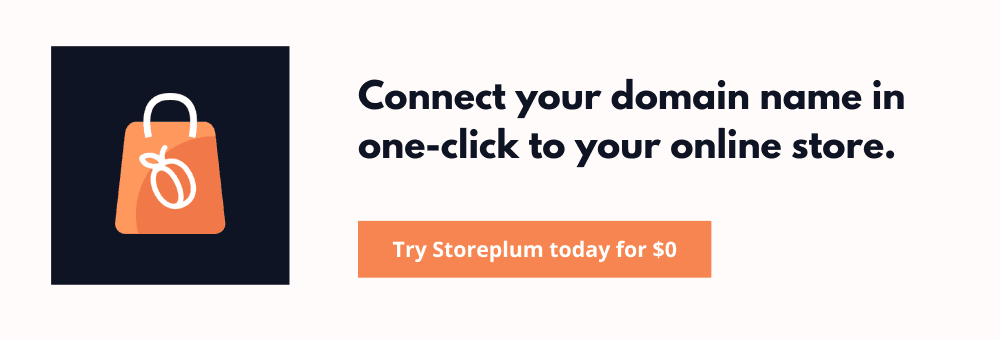How To Choose Top-level Domain Name And Domain Extensions

By Storeplum Editorial
Posted | 15 min read
Table of contents
- Introduction
- Generic Top-Level Domains (gTLDs)
- Ecommerce specific Top-Level Domains
- Country Code Top-Level Domains (ccTLDs)
- New and Niche Top-Level Domains (nTLDs)
- SEO implications of domain extensions
- Influencing brand image with domain extensions
- Domain availability and costs
- Future-proofing your domain extension strategy
Introduction
In this blog, we'll explore the importance of choosing the right domain extension for your e-commerce business, and provide practical tips and insights to help you make the best choice for your brand.
There is a lot to it than just using one that is easy to remember.
By the end of this blog, you'll have a better understanding of the factors to consider when choosing a domain extension, and how to make the right choice for your e-commerce business.
The relationship between domain extensions and credibility, SEO, and branding
A perfect domain name is one of the first things that potential customers see when they visit your website, and it can impact their first impression of your business.
You can acquire domain privacy or get a domain using any available domain name system.
Choosing the right domain extension can help to establish trust with your audience.
In terms of SEO, popular domain extensions can also impact your search engine rankings.
Google tends to prioritize websites with a .com extension, but other extensions can still rank well if they have quality content and strong backlinks.
Domain extensions also play a role in your branding efforts.
A unique or creative extension can help to differentiate your brand from competitors, while a more traditional extension can convey a sense of stability and reliability.
Key factors to consider while selecting a domain extension
Before we do a deep dive on the topic, let's take a quick look at some of the key factors to consider while selecting a domain extension for your ecommerce business.
-
Branding: Consider how your domain extension aligns with your brand and whether it can help you stand out from competitors.
-
Credibility: Choose a domain extension that is widely recognized and trusted by consumers, such as .com or .org.
-
SEO: Consider how your domain extension can impact your search engine rankings. While .com is preferred by Google, other extensions can still rank well if they have quality content and strong backlinks for any individual or business.
-
Geography: If you're targeting a specific geographic region, use your domain with a country-specific domain extension like .co.uk for the UK or .ca for Canada.
-
Availability: Some domain extensions may not be available, so consider alternative options or variations on your preferred domain name.
Select a domain extension that aligns with your business goals and values, and helps to build credibility, improve SEO, and strengthen branding efforts.
Generic Top-Level Domains (gTLDs)
gTLDs, or generic top-level domains, are a type of domain extension that are not associated with a specific country or geographic region.
Examples of gTLDs include .com, .org, and .net.
These domain extensions are significant because they have become widely recognized and trusted by consumers.
For example, .com has been the most popular gTLD for decades and is synonymous with the Internet itself.
When people think of a website, they often automatically assume it has a .com domain extension.
While country-specific domain extensions can be important for local businesses, gTLDs are essential for building a global online presence.
In a way, choosing a recognized and trusted gTLD can establish credibility and attract a wider audience for your business.
Popular gTLDs for ecommerce businesses
gTLDs, such as .shop, .store, and .online, have become more popular in recent years for ecommerce businesses that want to create a more targeted and memorable domain name. Some popular domain name extensions in ecommerce are-
.com is the most widely recognized and trusted gTLD, and is synonymous with the internet itself. It is a great choice for businesses that want to establish a global online presence.
.net is often used by businesses that offer networking or technology-related products and services, as it suggests a connection to the internet.
.org is typically used by non-profit organizations, but can also be used by businesses that want to convey a sense of social responsibility or community engagement.
Pros and cons of using common gTLDs
When choosing a gTLD, consider the pros and cons and select a domain extension that aligns with your business goals and values.
Given below are some pros and cons of common domain extensions:
| Pros | Cons |
|---|---|
| Credibility: These gTLDs are widely recognized and trusted by consumers, which can help to establish credibility for your business. | Availability: Common gTLDs may be already taken, making it difficult to find an available domain name. |
| Global appeal: Common gTLDs like .com have a global appeal and can help to establish a global online presence for your business. | Generic: These gTLDs can be seen as generic and may not stand out from competitors. |
| SEO: These gTLDs are preferred by search engines like Google, which can help to improve your search engine rankings. | Limitations: These gTLDs may not be suitable for all types of businesses, especially those that have a more specific focus. |
Ecommerce specific Top-Level Domains
E-commerce focused tld extensions, such as .store and .shop, are domain extensions that are specifically designed for e-commerce businesses.
They have become more popular in recent years as online shopping has become increasingly prevalent.
These TLDs offer several benefits for e-commerce businesses-
Firstly, they can help to establish a clear and memorable brand identity that is directly related to the products or services being offered.
These don’t have as many country code domains as options.
These new tld urls can help to improve search engine rankings and attract more relevant traffic.
For example, a business selling pet products could use the domain name pets .shop, which could help to attract visitors who are specifically searching for pet-related products.
Benefits of using e-commerce specific TLDs
-
Clear brand identity: Ecommerce TLDs provide businesses with a domain name that is directly related to their industry or product. This helps to establish a clear and memorable brand identity.
-
Improved search engine rankings: Using an e-commerce TLD can help to improve search engine rankings for relevant keywords, which can attract more traffic to the website.
-
Greater availability: Unlike common TLDs like .com or .net, e-commerce TLDs have more availability, which makes it easier for businesses to find a domain name that suits their brand.
-
Industry recognition: Ecommerce TLDs are becoming more widely recognized and accepted by consumers, which can help to establish credibility for businesses that use them.
When is ecommerce TLD preferrable?
While e-commerce specific TLDs, such as .store and .shop, can offer several benefits for businesses operating in the ecommerce space, there may be cases where different domain extensions are available as feasible options.
It allows the business to maintain a broader online presence that is not limited to a specific industry.
In case of a business that has an established online presence with a strong brand identity and recognition, changing to a new available domain extensions may not be necessary or advantageous.
It's important to consider the availability of the desired domain name.
If the desired domain name is not available with an ecommerce TLD, it may be better to choose a different TLD rather than compromise on the brand identity.
Country Code Top-Level Domains (ccTLDs)
Country code top-level domains (ccTLDs) are domain extensions that are specific to a particular country or geographic region.
These domain extensions typically consist of two letters, such as .us for the United States or .ca for Canada.
The main role of ccTLDs is to indicate the geographic location of the website, which can be beneficial for businesses that operate primarily within a specific country or region.
For example, a Canadian business may choose to use the .ca ccTLD to signal to users that they primarily serve customers in Canada.
In addition to indicating geographic location, these can also offer other benefits such as improved search engine rankings within the target region, increased credibility with local customers, and protection of intellectual property rights within the country or region.
Benefits of using a ccTLD for targeting specific regions or countries
Using a ccTLD can be a useful strategy for businesses looking to establish a strong online presence within a specific geographic region. Below are some of it’s benefits:
-
Geographic targeting: It can signal to users that a website is primarily intended for a specific country or region, which can be useful for businesses that primarily serve customers within that area.
-
Improved search engine rankings: Using this can also help to improve search engine rankings within the target region, as search engines typically prioritize websites with ccTLDs that match the user's location.
-
Local credibility: It can help to establish local credibility and trust with customers, as it indicates that the business has a presence within the target region.
-
Protection of intellectual property: Registering it can also help to protect a business's intellectual property within the target country or region, as it may prevent others from using a similar domain name.
Considerations for international ecommerce businesses using ccTLDs
When it comes to international ecommerce businesses using country code top-level domains (ccTLDs), there are several considerations to keep in mind.
Here are some of the key factors to consider-
-
Target market: It's important to carefully evaluate the target market and determine if this is the best choice for that specific region or country.
-
Language and cultural differences: If targeting multiple countries with different languages and cultures, it may be necessary to create separate websites with ccTLDs to cater to each market.
-
Legal requirements: Some countries have strict regulations regarding domain registration and ownership, so it's important to research and comply with these requirements. It depends on the gov extension flexibility as well.
-
Logistics and infrastructure: It's important to have the necessary logistics and infrastructure in place to ensure a smooth experience for customers, such as local payment and shipping options.
-
Brand consistency: Using multiple extensions can present challenges for maintaining brand consistency, so it's important to have a clear strategy in place for managing these differences.
New and Niche Top-Level Domains (nTLDs)
In recent years, new and niche top-level domains (TLDs) have emerged as an alternative to traditional ones like .com or .net.
These new options offer more specific and memorable domain options for businesses looking to differentiate themselves online.
Here’s a list of tlds or let’s say introduction of new tld list:
.tech: This is targeted towards technology companies and startups, offering a unique domain option that signals the company's focus on innovation.
.online: It’s a versatile option for businesses of all kinds, offering a memorable and easy-to-remember domain extension.
.shop: This is specifically designed for e-commerce businesses, providing a clear signal to customers that the website is a shopping destination.
.club: It is a fun and engaging option for businesses or organizations focused on social events or communities.
Examples of nTLDs relevant to e-commerce (e.g., .fashion, .tech, .eco)
New top-level domains (nTLDs) offer a variety of options for e-commerce businesses to create a unique online presence.
These nTLDs can offer a creative way for businesses to differentiate themselves online and communicate their focus or values.
Instead of going with ones that are commonly used for websites, you can go for some unique ones. Below are some examples of new tlds that are relevant to ecommerce:
-
.fashion: This is perfect for businesses focused on fashion, such as clothing, accessories, or beauty products.
-
.tech: This is ideal for technology-focused businesses, such as software developers or hardware manufacturers.
-
.eco: This is designed for businesses focused on sustainability and environmentalism, providing a clear signal of their commitment to eco-friendly practices.
-
.shop: This is a great option for any e-commerce business, providing a clear signal to customers that the website is a shopping destination.
-
.store: This is similar to .shop and is designed specifically for online stores and ecommerce businesses.
Pros and cons of using nTLDs for your ecommerce business
| Pros | Cons |
|---|---|
| Unique branding: Using an nTLD can help a business stand out in a crowded market and create a unique brand identity. | Lack of recognition: Traditional TLDs like .com and .net are more recognizable to customers, and using an nTLD may cause confusion or make it more difficult for customers to find the website. |
| Niche targeting: Certain nTLDs, like .fashion or .eco, can signal a business's specific focus or values, helping to attract like-minded customers. | SEO impact: It's unclear if nTLDs have a positive or negative impact on search engine rankings, so using one may affect a business's visibility in search results. |
| Availability: As traditional TLDs become more saturated, nTLDs may offer more availability and greater options for businesses to secure their desired domain name. | Trust and credibility: Some customers may perceive nTLDs as less trustworthy or credible compared to traditional TLDs, potentially affecting a business's reputation. |
Assessing the relevance and potential impact of nTLDs on branding and SEO
From a branding perspective, using an nTLD that aligns with your business's niche or industry can signal to customers what your brand is all about.
For example, a fashion retailer could use the .fashion nTLD to communicate their focus on fashion.
An eco-friendly retailer could use the .eco nTLD to demonstrate their commitment to sustainability.
When it comes to SEO, the impact of nTLDs is still unclear.
While some experts believe that using an nTLD can help improve search rankings, others argue that traditional TLDs like .com and .net carry more weight in search algorithms.
However, it's worth noting that having a strong and relevant domain name, regardless of the TLD, can positively impact SEO.
SEO implications of domain extensions
Domain extensions can indicate the nature of your website.
There are some internet assigned numbers authority that have assigned names and numbers to these extensions and how efficient they will be.
You need to consider is the reputation and trustworthiness of certain domain extensions.
For instance, using a .gov or .edu extension can signal to search engines that your website is associated with a credible organization or institution, potentially boosting your website's authority and search rankings.
But, it's important to note that the impact of domain extensions on search engine rankings is likely to be minimal compared to other factors such as the quality and relevance of your website's content, backlinks, and user experience.
Best practices for optimizing your domain extension for SEO
First, choose a relevant domain extension that reflects your business's industry or niche.
For example, if you're running an ecommerce business focused on technology products, using a .tech or .store domain extension could be a good fit.
Next, incorporate your target keywords into your domain name and extension.
This can help signal to search engines what your website is about and improve your chances of ranking higher for relevant search queries.
Lastly, focus on building high-quality backlinks to your website from other relevant websites in your industry or niche.
This can signal to search engines that your website is reputable and authoritative, improving your chances of ranking higher in search results.
Influencing brand image with domain extensions
The domain extension you choose can impact how your brand is perceived by potential customers.
A .com extension is commonly associated with established and trustworthy businesses, while .net and .org are often used for non-profit organizations and tech companies respectively.
Ecommerce specific TLDs like .store and .shop can communicate a clear message to customers about what your business is all about.
On the other hand, using a new or obscure TLD can give the impression that your business is less established or trustworthy.
It's important to consider your target audience and what domain extension they may associate with a trustworthy and credible brand.
Also, using a relevant domain extension can help with recall and memorability, making it easier for customers to find your website again in the future.
Balancing creativity and memorability with customer expectations
One way to strike this balance is to consider your target audience and industry.
For example, a creative agency may benefit from a more unique extension like .design, while a financial institution may be better off with a more traditional extension like .com or .net.
It's also important to consider the expectations of your customers.
If your industry typically uses a certain extension, deviating from that may confuse or even deter potential customers.
For example, using a .store extension may work well for an e-commerce business, but using it for a law firm may not be the best choice.
Strategies for ensuring brand consistency across domain extensions
One effective strategy for ensuring brand consistency is to register multiple domain extensions and redirect them to a single primary domain.
This approach can help to prevent competitors or third-party websites from using similar domain names that could confuse customers or dilute brand recognition.
Another strategy is to use a consistent naming convention across all domain extensions, such as incorporating the brand name or key industry terms into the domain.
This can help to reinforce brand identity and make it easier for customers to remember the website address.
It's also important to ensure that all marketing materials, including social media profiles and email addresses, use the same domain extension and naming convention.
This can help to create a cohesive and professional image for the brand.
Domain availability and costs
With a plethora of options available, it can be overwhelming to choose the best domain name one that meets your requirements.
Before you purchase a domain that are available to anyone and everyone through a list, you need to consider some factors.
Availability and registration fees are important factors to consider when selecting a domain extension.
Some of the popular extensions such as .com, .net, and .org can come at a higher cost and may not be available for your desired domain name.
However, newer and more niche extensions such as .store, .online, or .tech may be less expensive and easier to secure.
Factors to consider when weighing the value of a domain extension
To find the perfect domain for your website, you need to consider some primary factors.
One of the primary factors is the relevance of the domain extension to the industry or niche of the business.
Another factor to consider is the potential impact of the domain extension on SEO and search engine rankings.
Some domain extensions may have a more positive impact on search engine rankings due to their relevance and the fact that they are more commonly searched for by users.
You should consider the level of competition and availability of the domain extension they are interested in.
Some domain extensions may be more popular and therefore have a higher level of competition, which may drive up registration fees.
It's also important to consider the cost of registering and maintaining the domain extension over time.
Importance of proactive domain registration and renewal
As the internet continues to expand, the competition for domain names has become increasingly fierce.
This has made it more important than ever for businesses to be proactive in their domain registration and renewal strategies.
Registering and renewing your domain in advance can help to prevent others from registering it first, as well as avoid the risk of losing your domain due to expiry.
In addition, it ensures that your business has a consistent online presence and avoids the confusion that can result from changing domain names.
To be proactive in domain registration and renewal, consider setting up automatic renewal options with your domain registrar or setting reminders for renewal dates.
It is also a good idea to register similar domain names or misspellings of your brand name to prevent competitors from taking advantage of them.
So you can keep track of the registration period to register your new domain name.
Future-proofing your domain extension strategy
Choosing the right domain extension for your business is a crucial decision, as it can impact your online presence and brand recognition.
With the availability of network of customers and online communities, with web-based service and a lot more, it’s critical to know the adaptability and scalability of your domain extension.
To assess the adaptability and scalability of your domain extension, consider the long-term vision for your business and how your online presence will support that vision.
Also, assess the technical capabilities and limitations of your chosen domain extension, such as the potential for subdomains and email hosting.
Registering alternative domain extensions to protect your brand
As a business owner, you need to protect your brand, maintaining its integrity and reputation.
One way to do this is by registering alternative domain extensions that could be used by competitors or malicious actors to harm your brand.
By owning multiple domain extensions, you can prevent others from using similar names or confusing customers.
There are various organizations to register a new domain whenever there’s a need to register a domain extension.
This will ensure that you have control over these extensions and prevent others from using them to deceive your customers or damage your reputation.
It's important to note that while registering alternative domain extensions can be a valuable tactic, it does come at a cost. Y
ou as a registrant will need to pay for each additional domain registration and renewal to the registry, which can add up over time.
However, the peace of mind and protection it provides may be worth the investment in the long run.
Monitoring domain extension trends and developments
Keeping up with the latest trends and developments in the domain extension landscape is essential for any business.
When it comes to choosing a new website domain extension or a new generic extension you need to go with first served basis and get an efficient domain.
New domain extensions are introduced regularly, and staying aware of these changes can help your business remain competitive and relevant in the online marketplace.
One way to stay on top of domain extension trends is by monitoring domain registration statistics, which can give you insight into which extensions are growing in popularity and which ones are losing traction.
This might make sense, that you can go with internet corporation for assigned names and have assistance.
Keeping tabs on industry news and updates can help you stay informed about changes to domain extension regulations, as well as any new extensions that may become available in the future.
Conclusion
Selecting the right domain extension for your e-commerce business is an essential step that can impact your brand image, search engine rankings, and customer trust.
The right domain extension can improve your SEO, create a more professional image, and even help your customers locate your business online.
However, with so many options available, it can be challenging to determine which domain extension is best for your business needs.
Consider factors such as the availability and registration fees, the relevance of the extension to your niche, and the adaptability and scalability of your chosen extension.
Don't forget to register alternative domain extensions to protect your brand and monitor domain extension trends and developments.
In conclusion, the right domain extension can make all the difference for your e-commerce business.
So, take the time to evaluate your options, weigh the pros and cons, and make an informed decision. Your website's success may depend on it.

Storeplum's in-house editorial team brings to you the best content when it comes to growing your online business on the Internet. We write about growth hacks, case studies, government schemes and other related information for e-commerce business.



